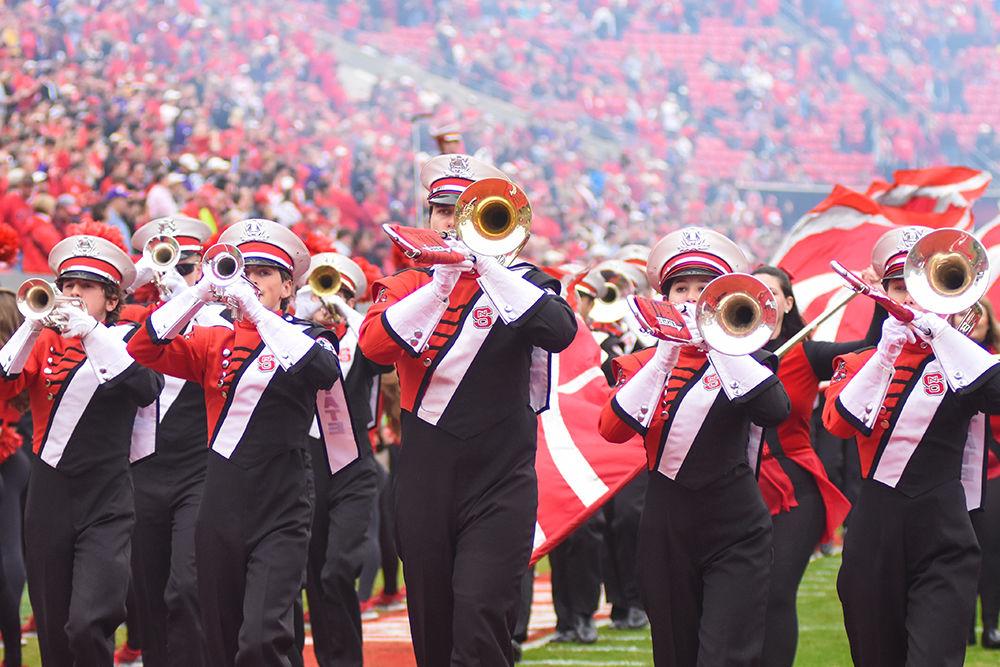
Sindy Huang // Archive
The NC State marching band performs before kickoff during the game against ECU on Saturday, Dec. 1, 2018 in Carter-Finley Stadium. The Wolfpack beat the Pirates 58-3, for a 9-3 season.
In college sports, you have the thrill of watching raw prospects fight for a spot in the draft, the bitter interconference rivalries and the fun of cheering on your fellow students to a victory. But one of the biggest reasons why college sports games get so hype is the bands and the fight songs.
Marching bands and pep bands are what make college football and basketball more watchable and entertaining than their professional counterparts. If professional sports were to incorporate bands, they would generate more revenue from ticket sales and TV ratings, they would increase fan attention and immersion, and most importantly, they would create jobs for many people.
Some might say increased revenue might seem a little far-fetched, but it’s not the band itself that brings in fans — it’s the atmosphere it generates. Most professional teams play pop or trap music to pump the fans up, along with graphics and instructions appearing on the jumbotron saying “get loud” or “make some noise.” Sometimes they even have a chant, like the Carolina Hurricanes’ “Let’s Go Canes.” Chants in professional sports are nothing new; just take a look at England and its football clubs. Chants go on all the time, but most, if not all, of these chants start with the fans. One of the most well-known songs associated with a professional sports team is the age-old “Go Cubs Go” song for the Chicago Cubs baseball team.
College marching and pep bands have proved they are welcome additions that breed a thick atmosphere that is unique, but professional teams and their fans also like to dabble in chanting, singing and cheering. If there were a group dedicated to leading these chants, playing these fight songs and filling the stadiums up with pride and noise, fan attention and immersion would skyrocket, along with sales. If the atmosphere of a game is great enough, fans who are not as dedicated will want to come back for more.
It would certainly take time to incorporate songs and chants into a professional environment, as well as to generate and create songs and chants specific to a team. But the idea of having a band play at a sporting event is completely fine thanks to college games. We have the information on what to do, when to play, how to play and what to play during games. All we need to do now is move it to the professional level.
One of the biggest pros from this plan, besides the atmosphere and fan involvement, is the creation of jobs. Hundreds of job openings will be created for musicians and band members — jobs that could be filled in from college programs. College is usually the last stop for marching and pep band members, but if there were a new professional program for musicians in the sporting world, college band players could easily transition from a school responsibility to a full-blown job. If young musicians had a means of continuing to grow and perform on a larger scale, that would be a huge plus.
One argument against this plan is that the reduction of seating in stadiums to fit the band would jack up ticket prices. While this may become an issue for some, I know full well that people who are fans of a sport will pay whatever they need to in order to see their favorite team. This argument could also be applied to college, yet there seems to be no issue with regard to attendance and price. Speaking of which, college games are even pricier than professional sports games in a lot of cases, yet their turnout is just as impressive, if not more so, than those pro matchups.
The reason games are pricier is thanks to the hype and atmosphere that bands and players create. How do they create it? Through nostalgia for an alma mater and momentum-swinging, atmosphere-building fight songs and chants led by the schools’ bands. Fight songs, chants and instrumentals add to the hype and produce a camaraderie among fans. Just like seeing a stranger with a matching jersey, singing the same song with someone will unite fans under the banner of the team they are cheering for.
With few cons and a lot of pros, I honestly don’t know why marching and pep bands haven’t been added to professional basketball and football; it almost seems like a no-brainer. Some professional teams have even stolen college chants to help build an atmosphere, like the Kansas City Chiefs stealing the FSU Seminoles fight song. All the teams need is a little executive push, and this idea could very well become a reality.